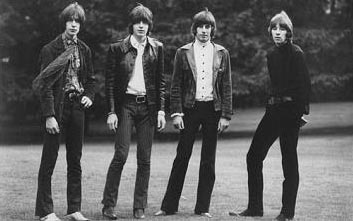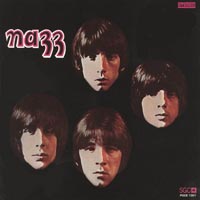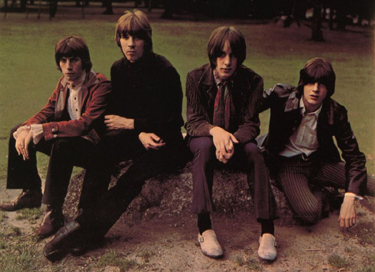The Nazz

Ahead of the Power Pop Curve?
By Ryan Settee
(August 2008)
There's certain artists that evolve over the course of their career, that certain periods of theirs become forgotten--people like Bowie, Iggy Pop, Lou Reed or even Neil Young in his radical early 80's incarnation with The Shocking Pinks or whatever. They all change so much that it's easy to love or hate or overlook certain eras of their output. Todd Rundgren is no different in this aspect, in that he easily has albums or periods of his career that one is bound to like more than the others.Todd originally started out in the Nazz--based out of Philadelphia and formed in 1967. For some reason, the Nazz stuff seems to be overlooked in his career, and I'm not totally sure why. While it may be a bold statement to say that the Nazz were ahead of their time, considering that they blatantly and overtly flaunted mod and British Invasion worship in the form of The Who and The Beatles and Cream (ironically, just as Clapton was tiring of the extended rock jams and freakouts), it's true. By the time that the late sixties rolled around, the early '60's British Invasion music was on its way out, and the Nazz were just ahead of the power pop tag --they were too late to be considered a part of the original British Invasion pop movement but also too early to be put into the category of power pop.
But certainly, they were pop, with power. The Who style breakdowns and "refrigerator falling down the stairs" crash and burn styled Moon the Loon drum fills, coupled with extensively coordinated three part vocal harmonies--along with Hendrix and Cream styled fuzz rock psychedelia and some garage-styled Yardbirds rock--made them derivative of their influences for sure. But, they were wholly unique in the way that they blended those influences. They rocked harder than the Beatles did, but also upped the ante of the harmonies and melodies of early Who records and added organs and pianos and psych freakouts to that early Who template, just as the Who were de-emphasizing the multi part harmonies for the more straightforward rock sound of albums like Who's Next. Along with Todd's eventual penchant for jazzier, more piano-based songwriting that would surface as soon as their first single in "Hello It's Me" (redone a few years later in Todd's solo career), I'll outline how developed Todd really was between the ages 19-21, during his time in the Nazz's criminally short lifespan.
Even though the band is a band in name, it's basically all Todd--his songwriting, his arrangements. Todd later remarked ".... I continued to develop myself as a songwriter and (as) a performer. Eventually everyone would feel like a back up band---I was writing the songs, producing the records. As time went on my presence was bound to distort the thing" (1). Putting that in perspective, there was no real John, Paul, George or Ringo or Pete, or Roger, creative-wise. Todd was handling all of those creative directions. And his guitar and lead guitar playing skills were--for someone that was 19-21--what any guitarist would wish for at any age. In essence, he was that good, that early on. But even Todd seems to be at odds with what he was doing back then:
"I've made peace with it, but a lot of potential was wasted. I don't blame any single person for that. I had a hard time focusing on the band."(2)
So even by Todd's own words, it seems like his time in the Nazz was a learning experience that he's not entirely sure of. This is a reason why, perhaps, the Nazz aren't exactly household names and are more of Nuggets fanfare and obscurist's or completists lore or that sort of thing. But as with someone who is as diverse as he is, sometimes what those artists consider their best work comes from a standpoint of emotional content and/or a certain period of time in their life where they were the most satisfied with themselves. It doesn't always necessarily transfer or connect with us though. Given the understanding that Todd maybe considers his Nazz era as a time of, perhaps, "youthful exuberance" or naivety, some of my most favorite moments from bands and artists were when they inadvertently ambled into brilliance via naivety. It's the exact reason why I think Blue Cheer got worse with each subsequent record, as they learned more.
Rounding out the Nazz was Carston Van Osten on bass (also a member of Todd's pre-Nazz band, Woody's Truck Stop), drummer Thom Mooney and singer/pianist/organist, Robert "Stewkey" Antoni. According to Todd, "Carson and I had figured out what The Nazz was going to be before I played my last gig with Woody's Truck Stop. We didn't waste a lot of time. It was consciously this British-style presentation of fashion sense and musical foundation, and elaborate vocal arrangements that would be represented by The Beatles and The Beach Boys".(3) Named after a Yardbirds' B-side, "The Nazz Are Blue," the basis of the band was well on it's way. "...We put our look together, that was what we most worried about. To find our clothes, we bought suits so we all looked the same. We were trying to put together all the accoutrements of a traveling band, scoping out ambulances, hearses. None of us had written a song that mattered, or finished a song"(4).
The Nazz played their first show on June 18, 1967, opening for the Doors at Philadelphia Town Hall, promoted by Jerry Bartoff and Jack Warfield. It went so well that after The Nazz were talking to their hero Roger Daltrey--at the Holiday Inn-- that they were approached by John Kurland, who bought The Nazz out from Jerry and Jack. But they didn't do much playing out. Says Todd, "We didn't do a lot of gigs. We would go to parties and events just so we could be seen, in a limousine all dressed up. Never playing anywhere, just being everywhere. It was frustrating watching everybody else play"(5). Now I'm personally wondering whether or not all the inactivity had stunted some of The Nazz's appeal and eventual recognition--both then and now. It certainly makes one wonder what the short term and long term repercussions of the band's popularity may have been. Says Stewkey: "...Our management didn't want us to be overexposed. This meant we didn't overplay ourselves. But we lost a lot of stage technique which we had to find again".(6)
Recently signed to Screen Gems Columbia, the band didn't want to be branded as a "New Monkees"--especially given the restrictions that they were given towards performing out live and being a functioning live band. Perhaps adding to the misguided worries that they were a pre-fab teeny-bopper styled "style over substance" band, they were in magazines such as 16 and Teen Beat.
They went into I.D. Sound Studios in Hollywood to record, originally with Felix Pappalardi in mind for producing. "I liked the work Felix Pappalardi had done on a record by The Youngbloods. He decided that he wanted to do the album, then I heard Disraeli Gears (by Cream, Felix producing it) and I didn't like the sound. The drums sounded all flat and floppy"(7). Bill Traut was hired, but Rundgren wasn't happy with his work. "We would up with a producer who didn't really do anything except read the trade papers. He didn't have any music suggestions. We should have got someone like Glyn Johns. We didn't realize the difference between the engineer and the producer"(8). Eventually, Todd remixed Traut's mixes of "Open My Eyes"/"Hello It's Me" and it became the first single. "He went through a mix of the album and left, so we decided to mix it again. It was the first time I put my hands on a board. I'd been watching and realized this can't be that hard. We did some overdubs in New York, some vibes on 'Hello It's Me.' 'Open My Eyes' was also completed in New York, hence the band production credit, also given for 'Hello It's Me'"(9). So clearly, Todd was the one in control of The Nazz's direction, from the writing to the production to arrangements, right from the start. Todd's history of producing music had emanated right from The Nazz's first single.
The band, though, wasn't without their detractors. Billboard magazine reviewed one of The Nazz's shows at New York's Cafe Au Go-Go: "...(The Nazz) lacked distinctive quality... (were) relentless in sound, but rarely showed an individual flair" (10).

When the 1st album The Nazz was released in 1968, it received generally favorable reviews and had a Beatles-styled cover featuring each band members' shadowed faces in black and white. While the rockers and rave-ups like the lead off single "Open My Eyes," as well as "Wildwood Blues" and "Back Of Your Mind" featured some great melodies and harmonies amidst intense and ferocious playing by the band, it's the aforementioned "Hello It's Me"-- with it's nearly jazzy chord progressions-- that leave the most lasting impression, and also prove that Rundgren was coming into his own as a first rate, stellar music writer. The melodies in "Crowded" and "When I Get My Plane" are beautiful, but the real highlight of the album is "If That's The Way You Feel"--featuring piano, elaborate string arrangements and meticulous vocal harmonies. Rundgren: "That was my chance to ape Jimmy Webb. Really laborious for me. I didn't really know how to write music. Shorty Rogers (veteran jazz trumpeter/composer/arranger) did the arrangement and had to do a lot of corrections"(11). But The Nazz debut album wasn't extremely popular--perhaps due in part from the shift from the trend of harmony based vocals and the mod freakout styled bands to psychedelia, longer hair and hippie flower power culture that was springing up from the 1967-1970 era.
Undaunted, the band recorded a double album's worth of material for the follow-up album, originally to be titled Fungo Bat (there are versions out there with Todd singing the scratch tracks, apparently, to show to other members of the band, NOT erased due to inferiority as some reports claim). They went into Trident Studios to track it--most notably the place where the Beatles recorded "Hey Jude" and "Dear Prudence." But paperwork fell through, so they went, as for the first album, back to Hollywood's I.D. Studios.
But rifts in the band were already beginning to surface. Todd: "Things started to deteriorate really fast once we got to the second album. A lot of the guys were frustrated that much of the material was more thoughtful, keyboard orientated. I began to write a lot of things on the piano as The Nazz had a keyboard (player) around. It became too difficult to teach Stewkey the stuff I was working on. Stewkey was a fairly utilitarian keyboard player, he didn't spend a lot of time practicing. It wasn't like he was classically trained or strove to be a soloist. And I am starting to sing more, because Stewkey is either not convinced or uninspired by the songs. Everybody's getting pissed off because I am now the producer, trying to run things and be one of the guys in the band. The Beatles' last movie (Let It Be) show you what happened when someone in the band sticks their head up too high" (12).
My own personal slant on that statement--with band members thinking that Todd's direction and material at that point in time was inferior and, as well, Todd perhaps being under a lot of stress and also perhaps thinking overly negatively about the whole experience and possibly disowning the music a bit-- is exactly what makes The Nazz so brilliant, because you never knew what influence would show up where, when or why. On the last two albums--Nazz Nazz and Nazz III in which I treat them as the proper double album that they were intended to be--Todd's writing branched out more into an acoustic, often jazzier, piano based direction that was evident in "Hello It's Me." Songs like "Letters Don't Count," "Gonna Cry Today," "It's Not That Easy," "Resolution," "Take The Hand" all show a third dimension to Todd's writing that he'd carry into the bulk of the early part of his solo career. But it's "You Are My Window"--a drop dead gorgeous piano based piano and vocals song (this time sung by Todd) embellished with horns and flutes and strings--that keeps ascending and taking off into the stratosphere with unexpected chord shifts and dispensing with verse/chorus/verse repetition in favor of a song that keeps on developing and unfolding until it gently ebbs out into the same void that it emanated from. I can feel the hairs raising on the back of my neck as I write this. And songs like "Forget All About It" and "Not Wrong Long"--top notch melodic songs--amidst all the rockers like "Christopher Columbus," "Under The Ice," "Kiddie Boy" and "Magic Me"--balanced the proceedings out enough on the albums with delightfully goofy songs like "Meridian Leeward (a song about a pig "who ate the other half of Fred?") to take you up and then take you down and around.

Adding insult to injury is that by the time that Nazz Nazz was released, "Open My Eyes" had crept into the top 50 but the band had already broken up! But it would seem to cement the fact that The Nazz were ahead of their time, and by the time that they broke up, the momentum that they achieved was slowly starting to catch up to them. Had they been around longer, most likely, they would have put out some more great material. Todd's often since been a bit shy of the rock outs, and considering that the template of The Nazz---even with the Laura Nyro piano jazz type stuff of Nazz Nazz/Nazz III --was to infuse the rocker mod songs in there with pop songs and some other stylistic diversions, Todd may have been more apt to continue on with that template in needing the up to the down; the loud to the soft; the shades and hues to the more overt colors.
Todd actually wasn't thrilled about the appearance of Nazz III, released around the same time as his first solo album, Runt, in 1970. "I wasn't particularly happy about it. But The Nazz had proven commercially of no consequence" (15). Todd had originally tried to keep the Nazz together during the disintegration period, but said, "I was clinging on for a little while and decided it was not worth it. I did a few gigs with the band and whoever would show up as bass player, principally for the money. I was so angered by the way we had been manipulated by (John) Kurland (manager of The Nazz), that I never spoke to him again after the final meeting with The Nazz. I had to arrange a go between"(16). This statement would seem to imply that Todd has unfortunately disowned The Nazz material a bit, simply because it's equated with bad memories between him and his management and band members.
But standing on it's own--and in all due respect to the members' own admissions of their disdain for most of the band's material-- The Nazz's work has held up incredibly well throughout the years, carving a niche for the unabashed mod and British Invasion rock resurrection that would surface in the typical power pop bands in Big Star, The Raspberries and even Cheap Trick. Especially in songs like "Not Wrong Long"--with it's emphasis on harmonies and Keith Moon manic type drum breakdowns--rarely had pop had as much power before it.
NOTES:
(1-13, 15-16) From the liner notes of Open Our Eyes: The Anthology (Sanctuary, 2002)
(14) Interview with Ken Sharp, Ptolemaic Terrascope 21, September 1996